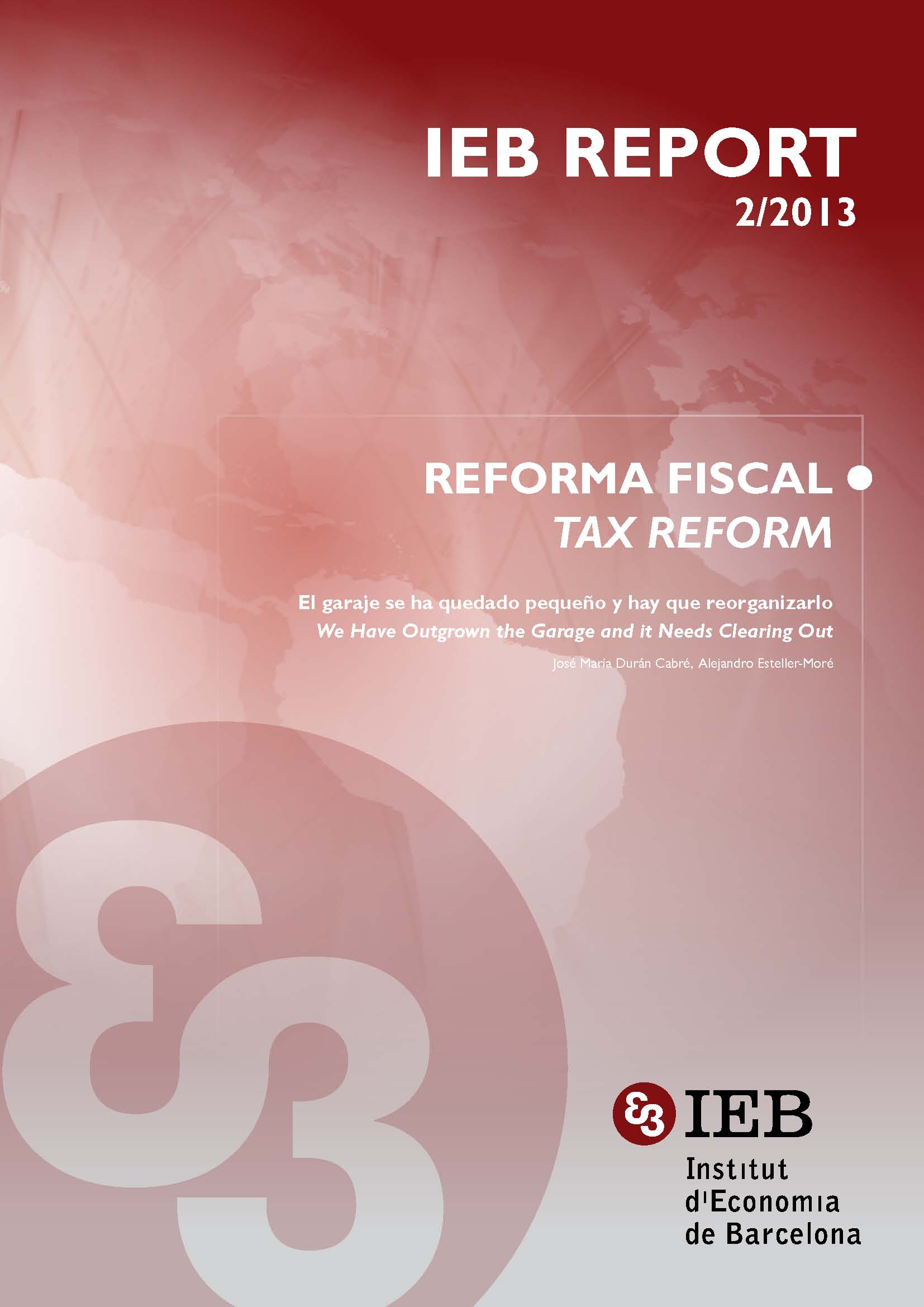 • Fifty tax system experts, including professionals working in public administration and academics from around Spain, have given their backing to the document
• Fifty tax system experts, including professionals working in public administration and academics from around Spain, have given their backing to the document
• The transition should be made gradually, but the long-term benefits for the economy and for society as a whole will be greater than the costs incurred
• The report also includes the results of a survey conducted with 272 tax experts from around Spain
The Barcelona Economics Institute (IEB), at the University of Barcelona (UB), has published a Decalogue outlining the measures that need to be included in a tax reform for Spain so as to ensure a fairer and more efficient tax collection system as well as one that is less complex. In addition to promoting greater transparency and clarity, the report considers the need to make changes to VAT, income tax, corporate tax and inheritance tax, and to eliminate the wealth tax. According to the study’s authors – IEB Professors José Mª Durán and Alejandro Esteller, “the transition should be made gradually, but the long-term benefits for the economy and for society as a whole will be greater than the costs incurred in its implementation”.
The Decalogue has received the support of fifty experts from around Spain, including academics and former heads of the public administration, which ensures a plurality of viewpoints as well as a broad geographical representation. The document forms part of the eBook Por una verdadera reforma fiscal, published by Editorial Ariel, and coordinated by Durán and Esteller.
The Decalogue, together with the names of the fifty experts, are made public in IEB Report 2/2013, which the Institute has just published and which undertakes an analysis of the key issues affecting the Spanish tax system. The report also includes the results of a survey conducted among professional tax consultants throughout Spain, whose opinions are very much in line with the views of the academics.
The essence of the Decalogue can be presented as follows:
1. Spain’s tax system should comprise a set of taxes that are technically well designed, coordinated one with another and readily understood by the public.
2. Not all the taxes serve all purposes, nor are they the sole instrument available to governments to achieve their goals.
3. Citizens must receive clear visual information about the taxes they pay, how much they pay and to which level of government they pay them.
4. Income tax reform should focus on the calculation of the taxable income, eliminating any special treatment. A good example is that of modular estimation, which requires a complete overhaul.
5. The current crisis highlights the fact that the corporate tax should not worsen the companies’ debt burden. Thus, financing from their own funds should be tax deductible.
6. Corporate tax needs to be reduced to make Spain more fiscally attractive and so encourage international investment.
7. The wealth tax should be eliminated given that it represents a minimal source of revenue. Yet, the inheritance and gift tax should be retained; however, it needs to be overhauled to ensure the standardisation of tax regulations across the Autonomous Communities.
8. VAT can be strengthened by removing as many of the exemptions, reduced rates and special regimes as possible.
9. The independence and professionalism of the governing bodies of the Tax Agency need to be strengthened, improving, among other aspects, the fight against fraud and the degree of coordination between administrations.
10. The joint fiscal responsibility of the autonomous governments needs to be made more effective by providing them with greater regulatory powers, in coordination with the central government.
Among the fifty professionals that have given their support to this declaration, special mention should be made of Rafael Doménech (Chief Economist at BBVA Research), Antonio Durán-Sindreu (President of the Spanish Association of Tax Consultants), Francisco Pérez (Director of the Valencian Institute of Economic Research), Valentí Pich (President of the General Council of the Association of Economists of Spain), Josep Costa (former delegate in Barcelona of the State Tax Agency and former director of the Catalan Tax Agency) José Manuel de Bunes (former director general of Tributs), Antoni Zabalza (former Secretary to the State Treasury), Alberto Gago (former rector of the University of Vigo) and Juan A. Gimeno (former rector of UNED).
The Decalogue has also been supported by academics from the Complutense University of Madrid, the Public University of Navarra, the Autonomous University of Barcelona and the Universities of Santiago de Compostela, Zaragoza, Valencia, Oviedo, Vigo, Almeria, Murcia, the Balearic Islands, Girona, Lleida and Barcelona.
The opinion of professional tax experts
The Barcelona Economics Institute asked 272 professionals from the Spanish field of taxation their views on key issues that need to be debated before implementing fiscal reform. A wide range of different professional tax experts from offices throughout Spain were canvassed and these responses were recorded anonymously. The help of the Spanish Association of Tax Consultants and the Register of Fiscal Advisors was sought in administering the survey.
When asked about the need for tax reform, 88% of respondents believed a global overhaul was needed. The reasons for this overwhelming response are explained by the following opinions expressed in the survey. For example, 87% considered the Spanish tax system to be overly complex. Concerning the reasons for this, 98% believed it to be due to constant legislative changes. As regards the degree of fairness provided by the tax system, 95.5% of respondents reported that, based on their experience, the middle and working middle classes were the ones that contribute most, and not those with the highest incomes or greatest net worth. The professionals from the tax sector also expressed their views about the inequities generated by taxes, such as tax evasion and fiscal relocation. In the case of evasion, one of the conclusions suggests that fiscal decentralization has worsened the situation.

